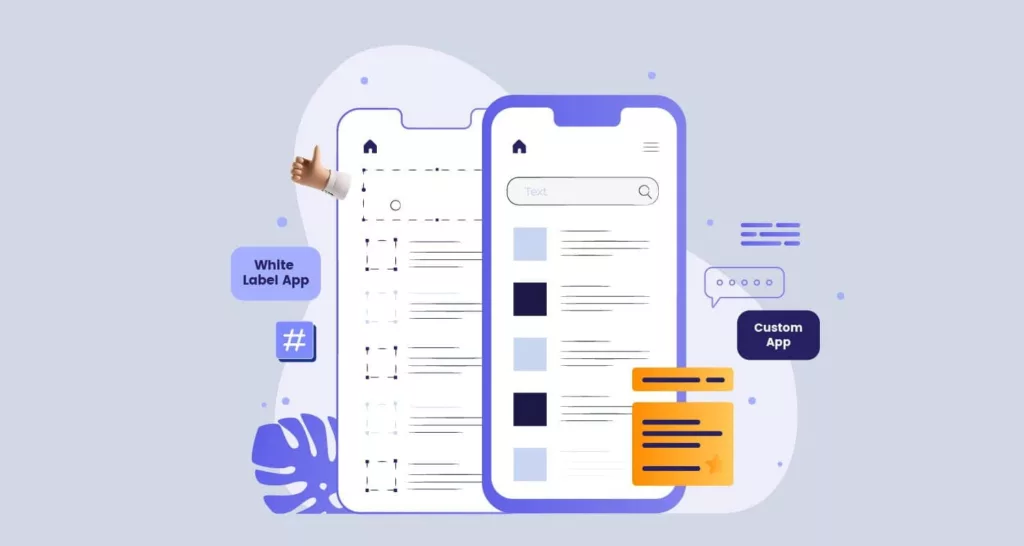“How to Build My Own Mobile App on a budget?” This is a frequently-asked question VINOVA receives from our customers when providing our IT Solution service.
The demand for mobile applications has skyrocketed in recent years. In 2023, consumer spending on mobile applications hit a new high at $171 billion, which was a 3% increase YoY. This leads to clients from small businesses searching for a method to create their apps.
Understanding that insight, let’s see if you can build your app, using a variety of tools and platforms that are particularly well-suited for beginner app developers, highlighting their respective pros and cons.
Table of Contents
Preparations To Create Your Mobile Apps
For aspiring entrepreneurs and small business owners, there are many cost-effective tools and platforms available to empower even the most tech novices to build their mobile apps.
However, it’s crucial to lay the groundwork through careful preparation, before diving into the technical aspects of building your mobile app. This foundational step may seem tedious, but it ultimately determines the success and cost-effectiveness of your app development journey. The groundwork process include:
- Defining Your App’s Purpose and Target Audience
- Get to know the demand of customers through Market Research and Competitor Analysis
- Organize & prepare a suitable Budget and Resources to build your app
By investing time and effort into this preparation phase you lay the foundation for a cost-effective and successful app development journey. Rather than diving headfirst into the technical aspects, taking the time to thoroughly plan and strategize will ensure that your app development efforts are aligned with your business goals and user requirements, ultimately leading to a more cost-efficient and impactful final product.
Tools and Platforms for Building Your Own Mobile App
As a beginner in the world of mobile app development, you have access to a variety of tools and platforms that can help you bring your idea to life without extensive coding knowledge or a large budget. Let’s explore some of the most popular and free app development sites and their respective pros and cons.
No-Code/Low-Code App Builders
No-code and low-code app builders, such as Appian, Zoho Creator, and Bubble, are designed to simplify the app development process by allowing users to create applications through visual interfaces and drag-and-drop functionality, rather than traditional coding.
Pros:
- Minimal technical expertise is required to build your mobile app.
- Rapid prototyping and deployment.
- Cost-effective compared to custom development.
- Scalable and flexible as your app-designing needs evolve.
Cons:
- Limited customization options for your self-built mobile app.
- Potential for vendor lock-in.
- Reduced control over the underlying codebase.
- Potential performance limitations for complex apps.
Cross-Platform Development Frameworks
Cross-platform development frameworks, such as React Native, Flutter, and Ionic, enable developers to build mobile apps that can run on both iOS and Android platforms using a single codebase, often written in languages like JavaScript, Dart, or TypeScript.
Pros:
- Write code once, deploy on multiple platforms for your self-built mobile app
- Potentially lower development costs
- Access to a wide range of pre-built components and libraries
- Improved code maintainability and scalability
Cons:
- Steeper learning curve compared to no-code/low-code options for building your mobile app
- Potential performance issues or platform-specific limitations
- Dependency on the framework’s ecosystem and community support
Drag-and-Drop App Creation Platforms
Similar to low-code and no-code app builders, drag-and-drop app creation platforms, such as Appian and Zoho Creator, allow users to design and build mobile apps using intuitive visual interfaces and pre-built components.
Pros:
- Minimal technical expertise is required to build your mobile app.
- Rapid prototyping and deployment.
- Customizable templates and design options.
- Integration with various data sources and services.
Cons:
- Limited flexibility and control over the app’s underlying architecture for your self-built mobile app
- Potential performance or scalability issues for complex apps
- Vendor lock-in and potential difficulties in migrating to other platforms
When selecting the right tool or platform for your journey, consider factors such as your technical expertise, the complexity of your app, the desired level of customization, and your budget. Evaluating the pros and cons of each option will help you choose the most suitable approach to build your own mobile app cost-effectively.
Being Cost-Effective When Building Your Apps

When it comes to building your own mobile app, it’s crucial to approach the development process in a strategic and cost-effective manner. By following these key steps, you can turn your app idea into reality without breaking the bank.
Ideation and Planning
The foundation of any successful mobile app endeavor starts with thorough ideation and planning. Begin by defining the purpose of your app and identifying your target audience. What problem does your app aim to solve, and who are the users you want to serve? Conduct market research and competitor analysis to understand the landscape and find ways to differentiate your offering.
With a clear understanding of your app’s purpose and target market, you can then prioritize features based on your available budget and resources. Focus on the essential, revenue-generating functionalities first, creating a minimum viable product (MVP) that addresses your users’ most pressing needs.
Prototyping and Design
Leverage online design tools such as Figma, Adobe XD, or Canva to create visually appealing prototypes for your project. Invest time in crafting a user-friendly and intuitive UI/UX, as this can significantly impact the cost-effectiveness of your development efforts. A well-designed app not only enhances the user experience but also reduces the need for costly revisions and iterations down the line.
Development and Testing
When it comes to the development phase, consider leveraging no-code/low-code platforms or cross-platform frameworks to build your own mobile app. These tools can help you streamline the development process and reduce costs, without sacrificing the quality of your final product.
Adopt a lean development approach, focusing on the MVP and iterating based on user feedback. Conduct thorough testing, including unit tests, integration tests, and user acceptance testing, to ensure the quality and stability of your app. This upfront investment in testing can help you avoid costly post-launch maintenance and support issues.
Deployment and Monetization
Explore cost-effective hosting and distribution platforms, such as app stores or cloud-based services, to deploy your project. Additionally, consider implementing monetization strategies, such as in-app purchases or subscription models, to generate revenue and offset your development costs.
By following this structured and cost-conscious approach to the app development process, you can turn your mobile app vision into a reality, while maximizing the return on your investment.
Where To Learn the Basics to Create My Own Mobile App?
As a budget-conscious beginner looking to build your own mobile app, you may be interested in exploring on some free source that do Tutorials or Courses that help you learn to create your own mobile app, VINOVA suggest some sources such as:
Online Tutorials and Courses
In addition to free app building platforms, you can also find a wealth of online tutorials and courses that can guide you through the process of building your own mobile app. These resources are often available at no cost and cover a wide range of topics, from app ideation to deployment. Some recommended platforms include:
- Udemy: Udemy offers numerous free courses on mobile app development, covering various frameworks and technologies.
- YouTube: YouTube is a treasure trove of free video tutorials, with channels dedicated to teaching building mobile app skills.
- FreeCodeCamp: This non-profit organization provides free online courses and resources for aspiring app developers.
- Codecademy: Codecademy offers interactive, browser-based lessons for learning to build mobile apps, often with free access.
Developer Communities and Forums
Connecting with like-minded individuals and tapping into the collective knowledge of the app development community can also be a valuable (and free) resource. Look for online forums, subreddits, and developer communities where you can ask questions, seek advice, and learn from the experiences of others who have embarked on the journey.
By leveraging these free app development sites, tutorials, and community resources, you can kickstart your project without incurring significant financial costs. This can be an excellent starting point as you explore the world of mobile app development and work towards bringing your app idea to life.

Where Aspiring App Developers Get Their Resources for Mobile App Building
Building a successful mobile app requires more than just technical skills and development tools. Aspiring app developers often rely on a diverse range of resources to support their “build my own mobile app” journey, from online tutorials to community-driven forums and even startup incubators.
Here is a forum you can look into for free resources while making your own mobile app:
Stack Overflow
Stack Overflow is a renowned question-and-answer platform for developers, where you can find solutions to a wide range of programming-related issues, including those specific to mobile app development.
Reddit’s /r/programming and /r/androiddev
The programming and Android development subreddits on Reddit are active hubs where aspiring app developers can engage with the community, share their projects, and seek guidance.
Developer-Focused Online Forums
Beyond popular platforms, there are various niche online forums dedicated to different aspects of mobile app development, where you can connect with experts and enthusiasts in your area of interest.
By actively participating in these developer communities and forums, you can tap into a wealth of knowledge, get invaluable insights, and potentially find like-minded collaborators to support your research on how to build a mobile app on your own.
Startup Incubators and Accelerators
If you’re looking to take your building mobile app project to the next level, consider exploring startup incubators and accelerators. These programs, such as Y Combinator and Techstars, often provide a range of resources, including mentorship, funding opportunities, and access to a network of industry experts and potential investors.
While the application process for these programs can be competitive, the support and guidance they offer can be instrumental in transforming your app idea into a successful and sustainable business.
Conclusion
Throughout this guide, we’ve explored the various tools, platforms, and resources available to help you bring your “build my own mobile app” vision to life in a cost-effective manner. From no-code/low-code app builders to cross-platform development frameworks, and from online tutorials to developer communities.
However, we understand that not everyone has the time, patience, or technical expertise to navigate the complexities of building their own mobile app. For those customers who are simply too busy or find the process daunting, VINOVA offers a solution.
As a leading mobile app development agency, VINOVA specializes in creating custom, high-quality mobile applications tailored to our clients’ unique needs. Our team of experienced developers, designers, and project managers can handle the entire app development process, from ideation to deployment, ensuring a seamless and cost-effective experience for our clients.
By partnering with VINOVA, customers can bypass the challenges of “building my own mobile app” and leverage our expertise to bring their app ideas to life. We’ll handle the technical complexities, optimize the development costs, and deliver a final product that exceeds their expectations – all while they focus on their core business objectives.